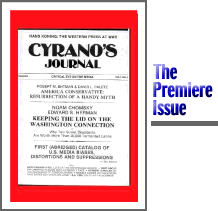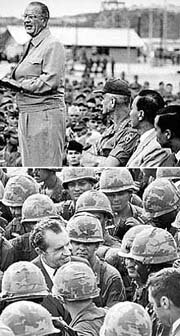It was during this period that most myths and propaganda mobilizations necessitated by the U.S. oligarchy were gradually developed, perfected and deployed (at home, mainly capitalizing on the US's population morbid fixation on religiosity, the Cold War was promptly billed as a "global effort to roll back Godless Communism"). The relentless propaganda, which continues to this day, has paid off handsomely. In keeping with the official line, and well into the Vietnam War, most Americans rarely questioned the "noble motives for which we were fighting." They understood practically nothing about the actual ideological roots of the war in Indochina, but they trusted their leaders. Today, while the level of skepticism and wariness about foreign adventures remains high, and has undoubtedly counted as a major factor in the reigning back of major U.S. military interventions abroad, it is safe to assume that the great majority of Americans still do not understand the moral and political reasons for which the Vietnam War was morally wrong, nor, for that matter, of the real underpinnings of U.S. foreign policy.
The historical juncture was propitious for the swallowing of jingoist lies. Right after World War II we "stood tall" as the world's preeminent superpower. Here was a powerful nation flushed with victory and presiding, almost by default, over a world in ruins and ready (except for Russia) to accept the inevitability of U.S. leadership. Equally important, the economic situation appeared to corroborate the claims made by the System about its own moral, political and economic superiority. After all, American capitalism, which had never fully recovered from the Great Depression until the start of the (second world) war, now found itself in 1946 in the enviable position of having to satisfy the pent-up consumption desires of the American people (many goods had been rationed or unavailable during the war) and the needs for reconstruction of entire economies. In this climate of general affluence and hope, critics of "free enterprise" and its "selfless" crusades to extend "freedom" and "democracy" found themselves not only outnumbered, as usual, but effectively silenced or intimidated by accusations of "disloyalty" and "treason." Indeed, the equating of capitalism with "Americanness" remains one of the most effective propaganda tools used by the System to stifle critics and legitimate adventures (see Catalog of Media Biases in this same issue).
But the truth implied in all reality (however difficult it may be to be accepted by some people) has an uncanny ability to resist and ultimately challenge even the most concentrated efforts at suppressing it. The revelations about CIA/FBI misconduct, Watergate and Vietnam, and the cynical interventions in Chile, El Salvador and other unfortunate places have accelerated the demise of American political innocence. But these advances in the public's general political awareness, and the accompanying erosion of the official mythologies and "historical truths" that normally buttress US foreign policy should not be read as a victory in the battle of communications. Despite the setbacks, and largely due to the real and imagined flaws and contradictions found in the socialist world, the corporate system retains a very impressive margin of good will and legitimacy among people, and its ubiquitous propaganda assets, far from diminishing, are constantly under active expansion.
However, as more and more citizens continue to abandon the corporate worldview, the System, increasingly beleaguered, may seek to deploy ever larger and more heavy-handed instruments of control and repression. And this may mean, as Bertram Gross so persuasively suggests in his book Friendly Fascism, an irrepressible slide toward the gradual dismantlement of the remaining bits of operating American democracy, and the substitution of a new form of fascism, a fascism with a presidential mask.
But who's to inform and alert the American people about these dangers? Can the media be regarded as reliable allies, willing and equipped to report the degenerative symptoms? If the record chalked up so far is any guide, the answer is no. As the articles in this issue make abundantly clear, the American mass communications system does not exist to inform as impartially as possible (or entertain according to the highest possible standards), but to serve as a distribution conduit for the System's ideological and economic wares. This simple fact puts the Amerian media, wittingly or unwittingly, in the role of being the System's chief disseminators of false consciousness, a task they are not likely to relinquish until the entire society is overhauled.
The whorish (if not moronic) nature of the Western media was brilliantly captured by Adam Hochschild, an editor with Mother Jones not too long ago. Writing about the almost total absence of competition encountered by his magazine in terms of quality investigative journalism, Hochschild had this to say:
We are willing to bet that the editors of The Nation, NACLA, The Progressive and other publications on the left side of the spectrum share Hochschild's evaluation, as we do. We would like to add, however, that in this context of "media malpractice" (what else are we to call the squandering and perverting of this precious social resource?), it is indeed to the credit of the American people that the incessant infliction of lies, idiocies, insanities and rank distortions of truth, all coupled with the aggressive marketing of an unworthy social ethic, has not at all disabled them in terms of moral and political judgments. The amazing amount of decency and honesty that we still observe in the U.S., despite all the above, is the greatest evidence for the System's eventual defeat, and the foundation of hope on which many Americans—along with millions of other people in the rest of the world—will build a new future of peace and justice for all.
--D.P. Greanville, for the editorial group
|


